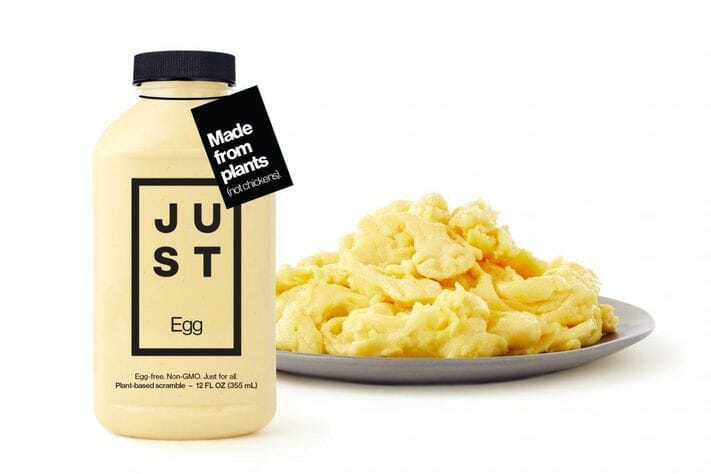Many of America’s animal protein powerhouses have been on the lookout for ways to capitalise on rising consumer demand for plant-based products. So far, this has led to a pick and mix of three strategic choices. Some have loudly developed and launched their own plant-y products, to varying degrees of success; some have quietly invested in alt protein startups, whether through their own venture arms or via specific VC investment houses; others, meanwhile, have opted to get in on the action with production or distribution partnerships. It would be hard to find a large protein player by 2020 still doing none of the above.
The latest of these protein partnerships was signed this week. It is a deal struck between JUST — a company producing plant-based egg alternative products derived largely from mung beans — and Michael Foods, a subsidiary of Post Holdings and one of the largest processors of value-added eggs in the world.
Under the arrangement, Michael Foods will be the exclusive manufacturer, supplier and distributor of JUST Egg in the US to foodservice and food ingredient customers who are already familiar with their egg brands such as Papetti’s, Abbotsford Farms, and Davidson’s Safest Choice.
In a press release sent to AFN, JUST CEO Josh Tetrick applauded his counterpart in the poultry industry, describing Michael Foods’ portfolio as “impressive” and calling the partnership “one of the proudest moments in our company’s journey to build a better food system.” These are conciliatory remarks for a plant-based company that in earlier years, branded as Hampton Creek, found itself in some pretty tough arm wrestles with some of America’s conventional protein producers. Fast forward to 2020, and cooperation rather than confrontation looks like the direction of travel, especially with widening consumer adoption of vegan or flexitarian eating habits.
“We are excited about this new partnership,” said Mark Westphal, president of Michael Foods. “Eggs,” he said, “will continue to be a nutritious and affordable staple in America’s diet.” JUST’s plant-based egg products, he added in a statement, “offer a great complement to our value-added eggs by allowing customers to serve every consumer their preference.”
Much has already been written elsewhere about how the Covid-19 pandemic could be a catalyst for these sorts of partnerships and potentially a spur for further investments, given how the last few months have seen significant growth in retail sales and various temporary closures of meat processing plants. During the F&A Next live webinar this month, Unilever executive Robbert de Vreede said that sales of its alt protein brand The Vegetarian Butcher were “through the roof;” other brands have told us the same. Research firm Nielsen backs this up, indicating that consumer purchases are somewhat compensating for restaurant shutdowns. Longer-term projections could also keep investor momentum going; UBS analysts say the plant-based meat market could grow 28% a year to $85 billion by 2030.
But there are no guarantees retail success will continue exponentially in a march toward veganism and flexitarianism. In Asia, for example, a study on alternative protein interest in China by the advocacy group Food Industry Asia (FIA) and market analysts AI Palette (disclosure: AgFunder portfolio company) detailed how interest can ebb and flow. Consumer interest in plant-based meat alternatives spiked at the height of China’s domestic Covid-19 crisis, when its strictest lockdown measures were in force and meat supplies faced significant disruption but the clamor for meat alternatives quickly subsided as the supply of traditional proteins and other food categories stabilized – indicating that companies offering such products need to do more brand-building in the Chinese market.
In the case of JUST, which is looking to get into the Chinese market, the pandemic offers a mixed picture. On the upside, the company now notes that with grocery sales, velocity has grown 51% since December with large gains at top national chains. However, it is not clear if that offsets temporary losses due to closures of foodservice destinations like college campuses, fast food joints, amusement parks, hospitals and corporate cafeterias that had added JUST Egg to their menus. Neither is it clear how social distancing measures will impact lab work and processing operations. With the lab work, the company is already notably behind targets on its ambitious plans for cultivated meat development. With processing, the company went asset-heavy with a purchase of a Minnesota processing facility in December, and it is hard to see how social distancing will not be an operational headache of sorts.
Andrew Noyes, head of global communications, responded to AFN: “We made substantial strides in the first quarter of this year before shelter in place guidance was enacted. Since the orders have been in place, essential work that pertains to our manufacturing operations and cultured meat program has continued to move forward.”
Two other potential Covid question marks lurk around JUST — one is how this will affect international expansion plans. With its plans in Europe, for instance, its product line still awaits regulatory approval.
The second question is about supply chains in a time of tighter restrictions on travel and trade. Its key ingredient is protein derived from mung beans, a legume that has been cultivated for thousands of years and is a dietary staple in Asia. Africa and Asia are the two main sources of JUST’s mung beans, and this may need a rethink if a second wave of the virus heads to either continent. Equally, scrutiny will eventually turn to the sustainability of production practices there, including fair treatment of mung bean growers.
Noyes said: “In China, our sales are up 30% since before COVID-19 on platforms like JD.com and Tmall and we are continuing to work to secure large-scale manufacturing, sales and distribution partnerships similar to the newly announced partnership with Michael Foods in the U.S. In Europe, we’re continuing to work with large retail and foodservice customers who are excited to make the product available as well as a growing consumer fan base who wants to be able to buy JUST Egg.”
As competition intensifies in the plant-based space, much of JUST’s success will rely on strong and transparent branding, sourcing and distribution. For those who have never tasted JUST Egg, it comes in two formats: a pourable liquid designed for scrambles, omelets, quiches, stir-fries and a wide variety of baking applications; and a fluffy, pre-baked folded egg patty, often served on top of toast or inside a breakfast sandwich. The food scientists at JUST say the product is “cholesterol-free, dairy-free, non-GMO, Kosher certified and is packed with as much protein as many other plant and animal proteins.” By its own in-house calculations (so maybe take these with a pinch of salt) its ingredients use 98% less water, 86% less land and emit 93% less CO2 than conventional animal sources.





